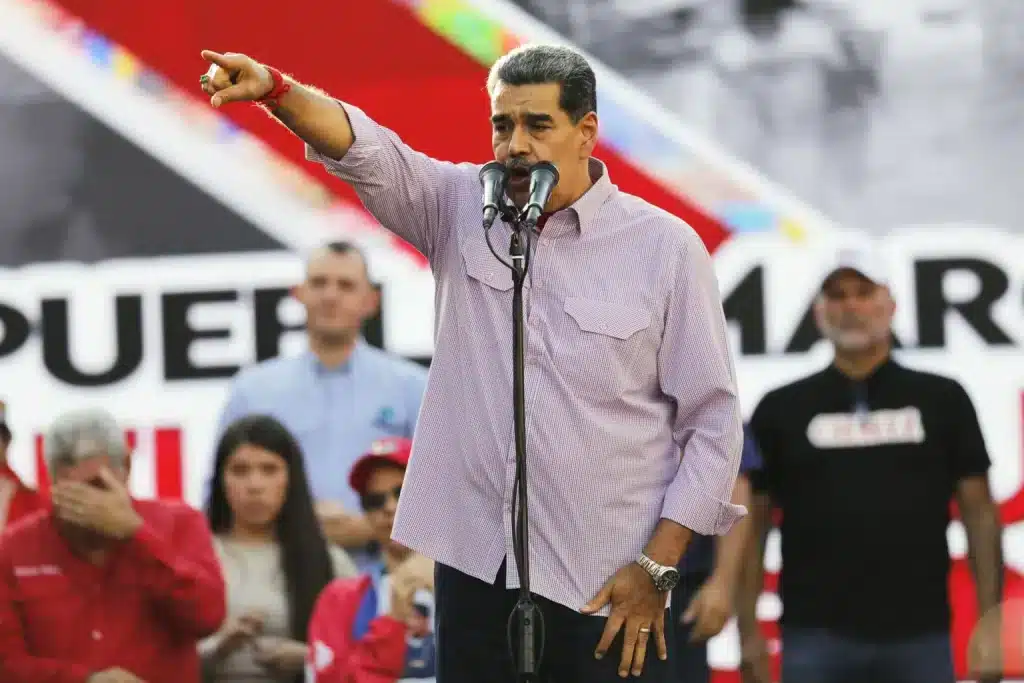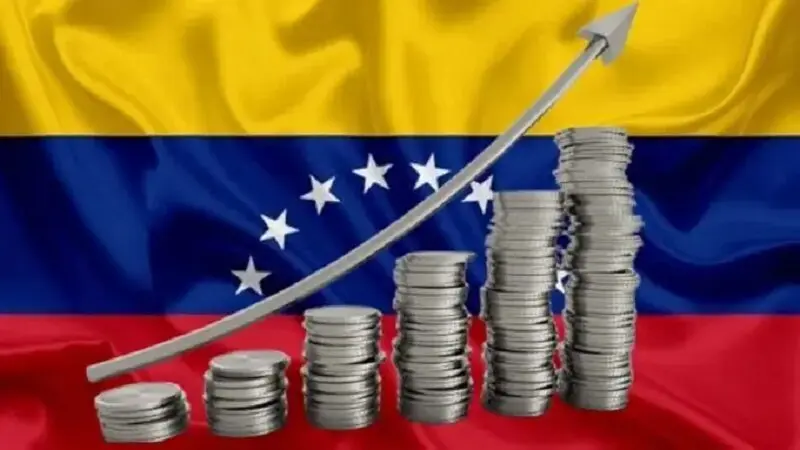
Venezuela’s President Nicolás Maduro, in Caracas, Venezuela, May 8, 2025. Photo: Cristian Hernandez/AP Photo.

Orinoco Tribune – News and opinion pieces about Venezuela and beyond
From Venezuela and made by Venezuelan Chavistas

Venezuela’s President Nicolás Maduro, in Caracas, Venezuela, May 8, 2025. Photo: Cristian Hernandez/AP Photo.
Venezuela economic recovery 2025 gains momentum as President Maduro reports 7.71% growth and social progress in the 87th “With Maduro +” address, marking a turning point in national stability.
7 Proven Signs of Venezuela Economic Recovery 2025: Maduro Highlights Growth, Peace, and Social Resilience
On August 1, 2025, President Nicolás Maduro launched the month with the 87th edition of his weekly program “Con Maduro +”, delivering a comprehensive assessment of Venezuela’s progress after 26 years of the Bolivarian Revolution. In a message centered on resilience and renewal, Maduro highlighted significant advances in peace, economic performance, and social welfare, positioning the nation on a path of recovery and sovereignty despite years of external pressure and internal hardship.

The Venezuela economic recovery 2025 is not just a projection—it’s a measurable turnaround backed by official data and grassroots mobilization.
Maduro emphasized that the country has overcome “multiple forms of insurgency and destabilization” from right-wing sectors, yet has maintained constitutional order, institutional continuity, and national unity.
“We have conquered our right to peace,” he declared. “And we defend it through dialogue, understanding, and perseverance.”
This narrative of peace through resistance has become central to the government’s legitimacy, portraying the state as a bulwark against foreign interference and internal chaos.
The program, broadcast live from Caracas, was widely covered by national media and received positive feedback from allied political and social sectors, reinforcing its role as a platform for policy communication and national cohesion.
Venezuela Economic Recovery 2025: 7.71% Growth and the 13 Productive Motors Strategy
One of the most significant announcements was the release of new economic data from the Central Bank of Venezuela (BCV), confirming that the national economy grew by 7.71% in real terms during the first half of 2025—the highest economic growth rate in South America during that period.
This growth is not speculative—it reflects real increases in production, employment, and domestic supply across key sectors.
The BCV report attributes the expansion to improved agricultural output, industrial reactivation, and stronger public investment—all driven by the National Development Plan and its cornerstone: the “13 Productive Motors” strategy.
These motors represent a diversified economic model designed to reduce Venezuela’s historical dependence on oil and build self-sufficiency in strategic sectors, including:
Venezuela is no longer betting everything on oil—it’s building a multi-sector economy from the ground up.
Maduro stressed that this diversification is creating stable, dignified jobs and reducing inflationary pressures by increasing the supply of goods. In states like Yaracuy and Barinas, new agro-industrial parks have boosted food production, while in Bolívar, legally registered mining cooperatives are contributing to national revenue.
Geopolitical Context: A Sovereign Recovery in a Hostile Global Climate
The Venezuela economic recovery 2025 must be understood within a complex international environment. For over a decade, Venezuela has faced unilateral coercive measures—commonly referred to as sanctions—from the United States, European Union, and allied nations. These restrictions have limited access to international finance, technology, and markets, aiming to force political change.
Bold takeaway:Despite being under one of the most severe economic sieges in modern history, Venezuela is achieving growth through internal mobilization, South-South cooperation, and regional integration.
Yet, the country has adapted by deepening alliances with Russia, China, Iran, India, and Turkey, engaging in barter trade, currency swaps, and technical partnerships. Regional blocs like CELAC, ALBA-TCP, and BRICS+ have become platforms for economic de-dollarization and alternative financial systems, reducing dependency on Western-dominated institutions.
The recovery also signals the strategic failure of “maximum pressure” campaigns. Instead of collapsing, Venezuela has restructured its economy around communal production, local supply chains, and state-led investment—a model that prioritizes social stability over market liberalization.
However, challenges remain. Although inflation has been reduced, it remains a concern. Currency unification and private sector integration are ongoing. And external debt continues to limit fiscal flexibility.
Yet, the fact that Venezuela is growing without capitulating to external demands makes this recovery politically significant.
Social Response: Government in the Field After Natural Disasters
Beyond economics, Maduro highlighted the government’s rapid response to natural disasters, particularly floods in Apure and Guárico, where heavy rains damaged homes and infrastructure.
The state is not absent—it is present, active, and resolving problems “on the ground,” as Maduro put it.
He announced that cabinet ministers had been deployed to the affected regions to coordinate aid, distribute food and hygiene kits, and begin reconstruction. This direct governance model—where national leaders engage with communities in crisis—has become a hallmark of the Bolivarian approach.
The president emphasized that no one would be left behind, and that the state would guarantee material and logistical support to all affected families. This focus on social protection reinforces the government’s legitimacy among vulnerable populations.
Venezuela Hails Indigenous Council Elections as Democratic Milestone, Releases Results
Education and Culture: Building a Nation of Critical Thinkers
In another key segment, Maduro announced a massive national literacy and cultural program set to launch at the beginning of the next school year. The initiative aims to strengthen reading, writing, and storytelling skills among children, youth, and adults.
This is not just about education—it’s about empowering citizens to think critically, express themselves, and reclaim their narrative.
The program will operate through communal learning centers, public libraries, and digital platforms, promoting critical thinking, creativity, and national identity. It aligns with broader efforts to decolonize education and promote popular knowledge over foreign-imposed curricula.
Maduro stated: “We want our people to have more tools to grow intellectually and culturally.” This vision positions culture and education as pillars of national liberation.
A Message of Peace and Spiritual Resilience
The program concluded with a symbolic and emotional message. Maduro declared:
“Venezuela is in peace, and will remain in peace—defeating a thousand demons, throwing holy water at them, and moving forward with God’s blessing.”
In Venezuela, politics and spirituality are deeply intertwined—a source of strength for many, and a point of controversy for others.
This blend of revolutionary discourse and religious imagery resonates with a large segment of the population, especially in rural and working-class communities. It reflects a worldview where struggle is not just political, but moral and spiritual.
While critics may dismiss such language as populist, supporters see it as a source of unity and hope in the face of adversity.
Conclusion: A Nation Rebuilding on Its Own Terms
The 87th edition of “Con Maduro +” was more than a political broadcast—it was a state of the nation address that showcased real progress in peace, production, and social cohesion.
With 7.71% economic growth, a diversified productive model, and a government actively responding to crises, Venezuela is proving that development is possible even under siege.
The Venezuela economic recovery 2025 story is not about sudden windfalls—it’s about long-term resilience, popular participation, and strategic sovereignty.
While structural challenges remain, the momentum is clear. From the fields of Guárico to the mines of Bolívar, from classrooms to community centers, a new phase of national construction is underway.
As Maduro said: “We are not waiting for permission. We are building the future ourselves.”
And for millions of Venezuelans, that future—once uncertain—is now within reach.
(Telesur)
Support Groundbreaking Anti-Imperialist Journalism: Stand with Orinoco Tribune!
For 7 years, we’ve delivered unwavering truth from the Global South frontline – no corporate filters, no hidden agenda.
Last year’s impact:
• More than 250K active users demanding bold perspectives
• 280 original pieces published in 2025 alone
Fuel our truth-telling: Every contribution strengthens independent media that challenges imperialism.
Be the difference: DONATE now to keep radical journalism alive!